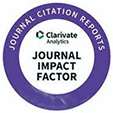ENCAPSULATION OF HORSERADISH PEROXIDASE-GLUCOSE OXIDASE (HRP-GOx) IN SILICA AQUAGEL SYNTHESIZED FROM RICE HULL ASH FOR ENZYMATIC REACTION OF GLUCOSE
Nuryono Nuryono(1*), Narsito Narsito(2), Endang Astuti(3)
(1) Department of Chemistry, Faculty of Mathematics and Natural Sciences, Universitas Gadjah Mada, Sekip Utara, Yogyakarta 55281
(2) Department of Chemistry, Faculty of Mathematics and Natural Sciences, Universitas Gadjah Mada, Sekip Utara, Yogyakarta 55281
(3) Department of Chemistry, Faculty of Mathematics and Natural Sciences, Universitas Gadjah Mada, Sekip Utara, Yogyakarta 55281
(*) Corresponding Author
Abstract
In recent years, the sol-gel technique has attracted increasing interest as a unique approach to immobilize biomolecules for bioanalytical applications as well as biochemical and biophysical studies. In this research, encapsulation of Horseradish peroxidase-Glucose oxidase (HRP-GOx) enzymes in silica aquagel from rice hull ash by sol-gel process has been carried out. In addition, the effect of several parameters (weight ratio of HRP to GOx, pH, temperature, sodium ion concentration) on enzyme activity was studied, as well. Rice hull ash, which was produced by ashing at 700 °C, was extracted it's silika by NaOH solution 1 M at 100 °C for two hours to produce sodium silikate (Na2SiO3) solution. The Na2SiO3 solution with pH of 13 was added with a strong cation exchanger resin, to produce sol solution with the pH of 4. Encapsulation was emphasized by mixing sol solution and phosphate buffer pH 7 containing HRP-GOx solution at volume ratio of buffer to sol solution 1:5. The mixture was transferred into 96-microwell plate and was aged for 24 hours. Enzymatic reaction was carried out by adding chromogenic solution of phenol and 4-aminoantipyrine (4-AAP) and b-D-glucose solution (as substrate) into the microwell. Enzymatic activity was examined by measuring absorbance of product solution at 490 nm with ELISA reader. Result of enzymatic activity for encapsulated enzymes (SGE) was compared to that for free enzymes (EB). Results showed that at the investigated condition, HRP-GOx enzymes gave high activity at weight ratio of HRP to GOx 10:1 and pH 7 for both SGE and EB. Encapsulation caused the enzymes activity decrease to 53.0±0.2 %. However, SGE was observed to be more stable on pH and temperature changes than EB. Study on the effect of sodium concentration showed that the increase of sodium concentration from 0.10 to 0.37 M decreased the enzymatic activity to 56±0.2%. Reusability test showed that the synthesized SGE was reusable with activity decrease of 60% within 23 days.
Keywords
Full Text:
Full Text PdfReferences
[1] Cass, T., and Ligler F.S., (Eds.), 1998, Immobilized Biomolecules in Analysis: A Practical Approach, Oxford University Press, Oxford, GB.
[2] Braun, S., Rappoport, S., Zusman, R., Avnir, D., and Ottolenghi, M., 1990, Mater. Lett., 10, 1.
[3] Avnir, D., Braun, S., Lev, O., and Ottolenghi, M., 1994, Chem. Mater., 6, 1605.
[4] Avnir, D., 1995, Acc. Chem. Res., 28, 328.
[5] Lan, E.H., Dunn, B., and Zink, J.I., 2005, Methods in Molecular Biology, in: T. Vo-Dinh (Ed.), Protein Nanotechnology, Protocols, Instrumentation and Applications, 300, Humana Press Inc., Totowa, p.53.
[6] Gill, I., and Ballesteros, A., 1998, J. Am. Chem. Soc., 120, 8575.
[7] Collinson, M.M., 1999, Crit. Rev. Anal. Chem., 29, 289.
[8] Gill, I., and Ballesteros, A., 2000, TIBTECH, 18, 282.
[9] Jin, W., and Brennan, J.D.F., 2002, Anal. Chim. Acta., 461, 1.
[10] Bhatia, R.B., and Brinker, C.J., 2000, Chem. Mater., 12, 2434-2441
[11] Nguyen, D.T., Mark S., Bruce D., and Jeffrey I.Z., 2002, Chem. Mater., 14 4300-4306.
[12] Nuryono, Hindryawati N., Astuti E., and Narsito, 2005, Study on Analysis of Lactate in Blood Serum by Spectrophotometric Method using Lactate Dehydrogenase Enzyme Encapsulated in Rice Hull Ash Derived Silika, Presented in Regional Conference on Pharmaceutical and Biomedical Analysis Held By School of Pharmacy, ITB, Bandung 15-16 September 20
[13] Chia-I. Li., Yi-Hua Lin, Cheng-Ling Shih, Jeng-Pyng Tsaur, and lai-Kwan Chau, 2002, Biosensors and Bioelectronics, 17, 323-330.
[14] Gill, I., and Ballesteros, A., 1998, J. Am. Chem. Soc., 120, 8587-8598
[15] Bhatia, R.B., Brinker, C.J., Gupta A.K., and Singh, A.K., 2000, Chem. Mater. 12, 2434-2441.
[16] Kalapathy, U., dan Proctor, A., 2000, Bioresource Technology, 73, 257-262.,
[17] Nuryono, Narsito, and Astuti, E., 2004, Review Kimia, 7(2), 67-81
[18] Proctor, A., 1990, JAOACS, 67(9), 576-584
[19] Kamath, S.R., and Proctor, A., 1998, Cereal Chemistry, 75, 484-487.
[20] Dixon, M., Tipton, K.F., Thorne, C.J.R., and Webb, E.C., 1979, Enzymes, Edisi 3, Longman, New York
Article Metrics
Copyright (c) 2010 Indonesian Journal of Chemistry

This work is licensed under a Creative Commons Attribution-NonCommercial-NoDerivatives 4.0 International License.
Indonesian Journal of Chemistry (ISSN 1411-9420 /e-ISSN 2460-1578) - Chemistry Department, Universitas Gadjah Mada, Indonesia.











